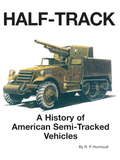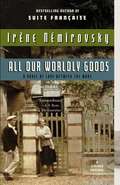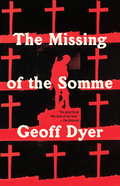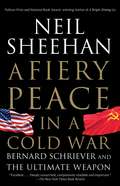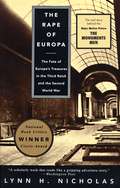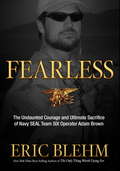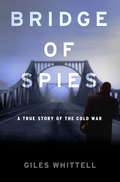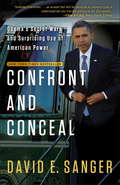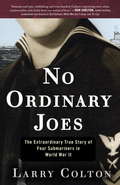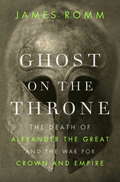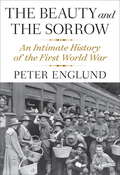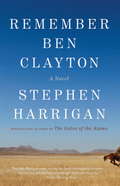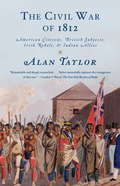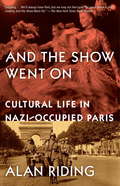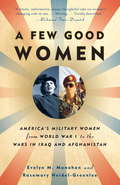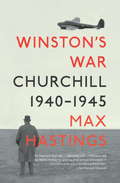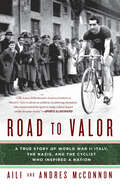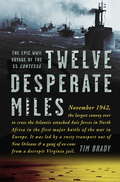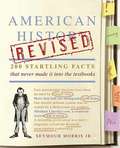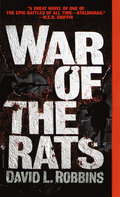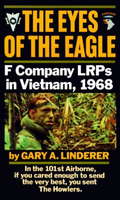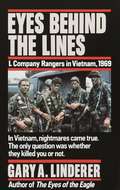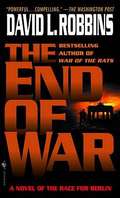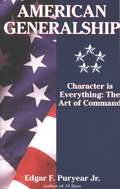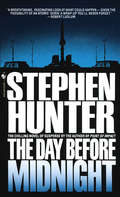- Table View
- List View
Half-Track: A History of American Semi-Tracked Vehicles
by R. P. HunnicuttThe half-track was one of the most plentiful families of American combat vehicles of World War II.
All Our Worldly Goods
by Rene NemirovskyIn haunting ways, this gorgeous novel prefigures Irène Némirovsky's masterpieceSuite Française. Set in France between 1910 and 1940 and first published in France in 1947, five years after the author's death in Auschwitz, All Our Worldly Goods is a gripping story of war, family life and star-crossed lovers. Pierre and Agnes marry for love against the wishes of his parents and his grandfather, the tyrannical family patriarch. Their marriage provokes a family feud that cascades down the generations. This brilliant novel is full of drama, heartbreak, and the telling observations that have made Némirovsky's work so beloved and admired. Translated by Sandra Smith,Note: Does not use standard American spelling or punctuation.
The Missing of the Somme (Phoenix Press Ser.)
by Geoff DyerFrom one of our most beloved, original authors, a classic book never before published in the U.S.--a personal meditation on war and remembrance. Geoff Dyer has won fans writing about everything from jazz to D.H. Lawrence, from photography to neurotic enlightenment, from Cambodia to Rome. The Missing of the Somme, his remarkable book on the significance of the First World War, is a gem for Dyer fans and history buffs alike. With his characteristic wit and insight, here Dyer weaves a network of myth and memory, photos and film, poetry and sculptures, graveyards, and ceremonies that illuminate our understanding of, and relationship to, the Great War.
A Fiery Peace in a Cold War: Bernard Schriever and the Ultimate Weapon
by Neil SheehanFrom Neil Sheehan, author of the Pulitzer Prize—winning classic A Bright Shining Lie, comes this long-awaited, magnificent epic. Here is the never-before-told story of the nuclear arms race that changed history–and of the visionary American Air Force officer Bernard Schriever, who led the high-stakes effort. A Fiery Peace in a Cold War is a masterly work about Schriever’s quests to prevent the Soviet Union from acquiring nuclear superiority, to penetrate and exploit space for America, and to build the first weapons meant to deter an atomic holocaust rather than to be fired in anger.Sheehan melds biography and history, politics and science, to create a sweeping narrative that transports the reader back and forth from individual drama to world stage. The narrative takes us from Schriever’s boyhood in Texas as a six-year-old immigrant from Germany in 1917 through his apprenticeship in the open-cockpit biplanes of the Army Air Corps in the 1930s and his participation in battles against the Japanese in the South Pacific during the Second World War. On his return, he finds a new postwar bipolar universe dominated by the antagonism between the United States and the Soviet Union.Inspired by his technological vision, Schriever sets out in 1954 to create the one class of weapons that can enforce peace with the Russians–intercontinental ballistic missiles that are unstoppable and can destroy the Soviet Union in thirty minutes. In the course of his crusade, he encounters allies and enemies among some of the most intriguing figures of the century: John von Neumann, the Hungarian-born mathematician and mathematical physicist, who was second in genius only to Einstein; Colonel Edward Hall, who created the ultimate ICBM in the Minuteman missile, and his brother, Theodore Hall, who spied for the Russians at Los Alamos and hastened their acquisition of the atomic bomb; Curtis LeMay, the bomber general who tried to exile Schriever and who lost his grip on reality, amassing enough nuclear weapons in his Strategic Air Command to destroy the entire Northern Hemisphere; and Hitler’s former rocket maker, Wernher von Braun, who along with a colorful, riding-crop-wielding Army general named John Medaris tried to steal the ICBM program.The most powerful men on earth are also put into astonishing relief: Joseph Stalin, the cruel, paranoid Soviet dictator who spurred his own scientists to build him the atomic bomb with threats of death; Dwight Eisenhower, who backed the ICBM program just in time to save it from the bureaucrats; Nikita Khrushchev, who brought the world to the edge of nuclear catastrophe during the Cuban Missile Crisis, and John Kennedy, who saved it.Schriever and his comrades endured the heartbreak of watching missiles explode on the launching pads at Cape Canaveral and savored the triumph of seeing them soar into space. In the end, they accomplished more than achieving a fiery peace in a cold war. Their missiles became the vehicles that opened space for America.
The Rape of Europa: The Fate of Europe’s Treasures in the Third Reich and the Second World War
by Lynn H. NicholasWinner of the National Book Critics Circle Award. The cast of characters includes Hitler and Goering, Gertrude Stein and Marc Chagall--not to mention works by artists from Leonardo da Vinci to Pablo Picasso. And the story told in this superbly researched and suspenseful book is that of the Third Reich's war on European culture and the Allies' desperate effort to preserve it. From the Nazi purges of "Degenerate Art" and Goering's shopping sprees in occupied Paris to the perilous journey of the Mona Lisa from Paris and the painstaking reclamation of the priceless treasures of liberated Italy, The Rape of Europa is a sweeping narrative of greed, philistinism, and heroism that combines superlative scholarship with a compelling drama. "Nicholas knows the art world as well as any military historian knows his battlefield. ... Her work deserves the widest reading."--New York Times Book Review.
Fearless: The Heroic Story of One Navy Seal's Sacrifice in the Hunt for Osama Bin Laden and the Unwavering Devotion of the Woman Who Loved Him
by Eric BlehmFearless takes you deep into SEAL Team SIX, straight to the heart of one of its most legendary operators. When Navy SEAL Adam Brown woke up on March 17, 2010, he didn't know he would die that night in the Hindu Kush Mountains of Afghanistan--but he was ready: In a letter to his children, not meant to be seen unless the worst happened, he wrote, "I'm not afraid of anything that might happen to me on this earth, because I know no matter what, nothing can take my spirit from me." Long before Adam Brown became a member of the elite SEAL Team SIX--the counterterrorism unit that took down Osama bin Laden--he was a fun-loving country boy from Hot Springs, Arkansas, whose greatest goal had been to wear his high school's football jersey. An undersized daredevil, prone to jumping off roofs into trees and off bridges into lakes, Adam was a kid who broke his own bones but would never break a promise to his parents.But after high school, Adam fell in with the wrong crowd and his family watched as his appetite for risk dragged him into a downward spiral that eventually landed him in jail. Battling his inner demons on a last-chance road to redemption, Adam had one goal: to become the best of the best--a US Navy SEAL. An absorbing chronicle of heroism and humanity, Fearless presents an indelible portrait of a highly trained warrior who would enter a village with weapons in hand to hunt terrorists, only to come back the next day with an armload of shoes and meals for local children. It is a deeply personal, revealing glimpse inside the SEAL Team SIX brotherhood that also shows how these elite operators live out the rest of their lives, away from danger, as husbands, fathers and friends. Fearless is the story of a man of extremes, whose courage and determination was fueled by faith, family, and the love of a woman. It's about a man who waged a war against his own worst impulses and persevered to reach the top tier of the US military. Always the first to volunteer for the most dangerous assignments, Adam's final act of bravery led to the ultimate sacrifice. Adam Brown was a devoted man who was an unlikely hero but a true warrior, described by all who knew him as fearless.
Bridge of Spies: A True Story of the Cold War
by Giles WhittellThe dramatic events behind the film, BRIDGE OF SPIES. Who were the three men the American and Soviet superpowers exchanged at Berlin's Glienicke Bridge and Checkpoint Charlie in the first and most legendary prisoner exchange between East and West? Bridge of Spies vividly traces their paths to that exchange on February 10, 1962, when their fate helped to define the conflicts and lethal undercurrents of the most dangerous years of the Cold War.Bridge of Spies is the true story of three extraordinary characters – William Fisher, alias Rudolf Abel, a British born KGB agent arrested by the FBI in New York City and jailed as a Soviet superspy for trying to steal America’s most precious nuclear secrets; Gary Powers, the American U-2 pilot who was captured when his plane was shot down while flying a reconnaissance mission over the closed cities of central Russia; and Frederic Pryor, a young American graduate student in Berlin mistakenly identified as a spy, arrested and held without charge by the Stasi, East Germany’s secret police. By weaving the three strands of this story together for the first time, Giles Whittell masterfully portrays the intense political tensions and nuclear brinkmanship that brought the United States and Soviet Union so close to a hot war in the early 1960s. He reveals the dramatic lives of men drawn into the nadir of the Cold War by duty and curiosity, and the tragicomedy of errors that eventually induced Khrushchev to send missiles to Castro. Two of his subjects — the spy and the pilot — were the original seekers of weapons of mass destruction. The third, an intellectual, fluent in German, unencumbered by dependents, and researching a Ph.D. thesis on the foreign trade system of the Soviet bloc, seemed to the Stasi precisely the sort of person the CIA should have been recruiting. He was not. In over his head in the world capital of spying, he was wrongly charged with espionage and thus came to the Agency’s notice by a more roundabout route. The three men were rescued against daunting odds by fate and by their families, and then all but forgotten. Yet they laid bare the pathological mistrust that fueled the arms race for the next 30 years. Drawing on new interviews conducted in the United States, Europe and Russia with key players in the exchange and the events leading to it, among them Frederic Pryor himself and the man who shot down Gary Powers, Bridge of Spies captures a time when the fate of the world really did depend on coded messages on microdots and brave young men in pressure suits. The exchange that frigid day at two of the most sensitive points along the Iron Curtain represented the first step back from where the superpowers had stood since the building of the Berlin Wall the previous summer – on the brink of World War III.From the Hardcover edition.
Confront and Conceal: Obama's Secret Wars and Surprising Use of American Power
by David E. SangerFROM INSIDE OBAMA&’S SITUATION ROOM . . . THE CRITICAL MOMENTS IN THE COVERT WAR AGAINST IRAN, THE STRUGGLES TO DEAL WITH A RECALCITRANT PAKISTAN AND ITS FAST-GROWING NUCLEAR ARSENAL, THE TENSIONS WITH THE AMERICAN MILITARY OVER AFGHANISTAN AND WITH ALLIES SWEPT UP IN THE CHAOS OF THE ARAB SPRING Three and a half years ago, David Sanger&’s book The Inheritance: The World Obama Confronts and the Challenges to American Power described how a new American president came to office with the world on fire. Now, just as the 2012 presidential election battle begins, Sanger follows up with an eye-opening, news-packed account of how Obama has dealt with those challenges, relying on innovative weapons and reconfigured tools of American power to try to manage a series of new threats. Sanger describes how Obama&’s early idealism about fighting &“a war of necessity&” in Afghanistan quickly turned to fatigue and frustration, how the early hopes that the Arab Spring would bring about a democratic awakening slipped away, and how an effort to re-establish American power in the Pacific set the stage for a new era of tensions with the world&’s great rising power, China. As the world seeks to understand the contours of the Obama Doctrine, Confront and Conceal is a fascinating, unflinching account of these complex years, in which the president and his administration have found themselves struggling to stay ahead in a world where power is diffuse and America&’s ability to exert control grows ever more elusive.
No Ordinary Joes: The Extraordinary True Story of Four Submariners in War and Love and Life
by Larry ColtonOn April 23, 1943, the seventy-man crew of the USS Grenadier scrambled to save their submarine—and themselves—after a Japanese aerial torpedo sent it crashing to the ocean floor. Miraculously, the men were able to bring the sub back to the surface, only to be captured by the Japanese.No Ordinary Joes tells the harrowing story of four of the Grenadier’s crew: Bob Palmer of Medford, Oregon; Chuck Vervalin of Dundee, New York; Tim McCoy of Dallas, Texas; and Gordy Cox of Yakima, Washington. All were enlistees from families that struggled through the Great Depression. The lure of service and duty to country were not their primary motivations—they were more compelled by the promise of a job that provided “three hots and a cot” and a steady paycheck. On the day they were captured, all four were still teenagers.Together, the men faced unimaginable brutality at the hands of their captors in a prisoner of war camp. With no training in how to respond in the face of relentless interrogations and with less than a cup of rice per day for sustenance, each man created his own strategy for survival. When the liberation finally came, all four anticipated a triumphant homecoming to waiting families, loved ones, and wives, but instead were forced to find a new kind of strength as they struggled to resume their lives in a world that had given them up for dead, and with the aftershocks of an experience that haunted and colored the rest of their days. Author Larry Colton brings the lives of these four “ordinary” heroes into brilliant focus. Theirs is a story of tragedy and courage, romance and war, loss and endurance, failure and redemption. With a scope both panoramic and disarmingly intimate, No Ordinary Joes is a powerful look at the atrocities of war, the reality of its aftermath, and the restorative power of love.From the Hardcover edition.
Ghost on the Throne: The Death of Alexander the Great and the Bloody Fight for His Empire
by James RommAlexander the Great, perhaps the most commanding leader in history, united his empire and his army by the titanic force of his will. His death at the age of thirty-two spelled the end of that unity.The story of Alexander's conquest of the Persian empire is known to many readers, but the dramatic and consequential saga of the empire's collapse remains virtually untold. It is a tale of loss that begins with the greatest loss of all, the death of the Macedonian king who had held the empire together. With his demise, it was as if the sun had disappeared from the solar system, as if planets and moons began to spin crazily in new directions, crashing into one another with unimaginable force.Alexander bequeathed his power, legend has it, "to the strongest," leaving behind a mentally damaged half brother and a posthumously born son as his only heirs. In a strange compromise, both figures--Philip III and Alexander IV--were elevated to the kingship, quickly becoming prizes, pawns, fought over by a half-dozen Macedonian generals. Each successor could confer legitimacy on whichever general controlled him.At the book's center is the monarch's most vigorous defender; Alexander's former Greek secretary, now transformed into a general himself. He was a man both fascinating and entertaining, a man full of tricks and connivances, like the enthroned ghost of Alexander that gives the book its title, and becomes the determining factor in the precarious fortunes of the royal family.James Romm, brilliant classicist and storyteller, tells the galvanizing saga of the men who followed Alexander and found themselves incapable of preserving his empire. The result was the undoing of a world, formerly united in a single empire, now ripped apart into a nightmare of warring nation-states struggling for domination, the template of our own times.From the Hardcover edition.
The Beauty and the Sorrow: An Intimate History of the First World War
by Peter Englund Peter GravesIn this masterly, highly original narrative history, Peter Englund takes a revelatory new approach to the history of World War I, magnifying its least examined, most stirring component: the experiences of the average man and woman--not only the tragedy and horror but also the absurdity and even, at times, the beauty. The twenty people from whose journals and letters Englund draws are from Belgium, Denmark, and France; Great Britain, Germany, and the Austro-Hungarian Empire; Italy, Australia, and New Zealand; Russia, Venezuela, and the United States. There is a young man in the British army infantry who had been considering emigrating until the war offered him its "grand promise of change" and a middle-aged French civil servant, a socialist and writer whose "faith simply crumbled" at the outbreak of war. There is a twelve-year-old German girl thrilled with the news of the army's victories because it means that she and her classmates are allowed to shout and scream at school. There is an American woman married to a Polish aristocrat, living a life of quiet luxury when the war begins but who will be moved, ultimately, to declare: Looking Death in the eyes, one loses the fear of Him. From field surgeon to nurse to fighter pilot, some are on the Western Front, others in the Balkans, East Africa, Mesopotamia. Two will die, one will never hear a shot fired; some will become prisoners of war, others will be celebrated as heroes. But despite their various war-time occupations and fates, genders and nationalities, they will be united by their involvement--witting or otherwise--in The Great, and terrible, War. A brilliant mosaic of perspectives that moves between the home front and the front lines, The Beauty and the Sorrow reconstructs the feelings, impressions, experiences, and shifting spirits of these twenty particular people, allowing them to speak not only for themselves but also for all those who were in some way shaped by the war, but whose voices have been forgotten, rejected, or simply remained unheard.he Hardcover edition.
Remember Ben Clayton
by Stephen HarriganFrom the author of the acclaimed best seller The Gates of the Alamo, a new novel that confirms and enlarges Stephen Harrigan's reputation as a major voice in American fiction.Francis "Gil" Gilheaney is a sculptor of boundless ambition. But bad fortune and his own prideful spirit have driven him from New York into artistic exile in Texas just after World War I. His adult daughter, Maureen, serves as his assistant, although she has artistic ambitions of her own and is beginning to understand how her own career--perhaps even her life--has become hostage to her driven father's "wild pursuit of glory." When Lamar Clayton, an aging, heartbroken rancher, offers Gil a commission to create a memorial statue of his son Ben, who was killed in the war, Gil seizes the opportunity to create what he believes will be his greatest achievement.As work proceeds on the statue, Gil and Maureen come to realize that their new client is a far more complicated man than he appeared to be on first acquaintance, and that Lamar is guarding a secret that haunts his relationship with his son even in death. But Gil is haunted as well: by the fear that his work will be forgotten and by an unconscionable lie whose discovery could cost him his daughter's love. The creation of the statue leads to a chain of dramatic encounters, through which Maureen will test the boundaries of her independence and Gil and Lamar, each in his own painful way, will confront their worth as fathers. Remember Ben Clayton vividly depicts a rich swath of American history, from the days when the Comanches ruled the Southern plains to the final brutal months of World War I. It ranges from outlaw settlements on the Texas frontier to the cafés of Paris, from Indian encampments to artists' ateliers to the forgotten battlefield in France where Ben Clayton died. It shows us the all-consuming labor that a monumental work of sculpture demands and the price it exacts from both artist and patron. And with unforgettable power and compassion it presents a deeply moving story about the bonds between fathers and children, and about the power and purpose of art.From the Hardcover edition.
The Civil War of 1812
by Alan TaylorIn this deeply researched and clearly written book, the Pulitzer Prize-winning historian Alan Taylor tells the riveting story of a war that redefined North America. During the early nineteenth century, Britons and Americans renewed their struggle over the legacy of the American Revolution. Soldiers, immigrants, settlers, and Indians fought in a northern borderland to determine the fate of a continent. Would revolutionary republicanism sweep the British from Canada? Or would the British empire contain, divide, and ruin the shaky American republic?In a world of double identities, slippery allegiances, and porous boundaries, the leaders of the republic and of the empire struggled to control their own diverse peoples. The border divided Americans--former Loyalists and Patriots--who fought on both sides in the new war, as did native peoples defending their homelands. Serving in both armies, Irish immigrants battled one another, reaping charges of rebellion and treason. And dissident Americans flirted with secession while aiding the British as smugglers and spies.During the war, both sides struggled to sustain armies in a northern land of immense forests, vast lakes, and stark seasonal swings in the weather. In that environment, many soldiers panicked as they fought their own vivid imaginations, which cast Indians as bloodthirsty savages. After fighting each other to a standstill, the Americans and the British concluded that they could safely share the continent along a border that favored the United States at the expense of Canadians and Indians. Both sides then celebrated victory by forgetting their losses and by betraying the native peoples.A vivid narrative of an often brutal (and sometimes comic) war that reveals much about the tangled origins of the United States and Canada.From the Hardcover edition.
And the Show Went On: Cultural Life in Nazi-occupied Paris
by Alan RidingIn June 1940, Paris fell to the Nazis who made the world's cultural capital their favourite entertainment ground. Music halls and cabarets thrived during the occupation, providing plenty of work for actors, singers and musicians - except for Jews. The likes of Maurice Chevalier and Edith Piaf, who had entertained the French troops, now unabashedly provided amusement to the Germans. After the invasion of France, those artists still in Paris had to find ways to survive. Although Matisse and others kept out of view, Picasso could not avoid Nazi visitors. A few, like Beckett, joined the Resistance. Some were arrested and died in German hands. Others entertained the enemy. The theatres reopened, the movie cameras rolled, galleries sold paintings looted from Jewish families, pro-German writers and their rivals fought in print. Told through the experiences of renowned creative figures and witnesses of the times, And the Show Went On is an authoritative account of how Paris's artistic world lived through the Occupation, both of those who suffered Nazi oppression and those who prospered through collaboration.
A Few Good Women: America’s Military Women from World War I to the Wars in Iraq and Afghanistan
by Evelyn M. Monahan Rosemary Neidel-GreenleeThe never-before-told story of the U. S. women's military corps: the women who fought for the right to defend their country by serving in the armed forces--a fight that continues today for American military women who want to serve in combat support positions.
Winston’s War: Churchill, 1940–1945
by Max HastingsWith unparalleled insight, Hastings presents a vivid and incisive portrait of Winston Churchill, bringing to life the man and his complexities, from his courage in the face of certain defeat to his shortcomings and private anxieties.
Road to Valor: A True Story of WWII Italy, the Nazis, and the Cyclist Who Inspired a Nation
by Aili McConnon Andres McConnonRoad to Valor is the inspiring, against-the-odds story of Gino Bartali, the cyclist who made the greatest comeback in Tour de France history and secretly aided the Italian resistance during World War II. Gino Bartali is best known as an Italian cycling legend: the man who not only won the Tour de France twice, but also holds the record for the longest time span between victories. During the ten years that separated his hard-won triumphs, his actions, both on and off the racecourse, ensured him a permanent place in Italian hearts and minds. In Road to Valor, Aili and Andres McConnon chronicle Bartali’s journey, starting in impoverished rural Tuscany where a scrawny, mischievous boy painstakingly saves his money to buy a bicycle and before long, is racking up wins throughout the country. At the age of 24, he stuns the world by winning the Tour de France and becomes an international sports icon. But Mussolini’s Fascists try to hijack his victory for propaganda purposes, derailing Bartali’s career, and as the Nazis occupy Italy, Bartali undertakes secret and dangerous activities to help those being targeted. He shelters a family of Jews in an apartment he financed with his cycling winnings and is able to smuggle counterfeit identity documents hidden in his bicycle past Fascist and Nazi checkpoints because the soldiers recognize him as a national hero in training. After the grueling wartime years, Bartali fights to rebuild his career as Italy emerges from the rubble. In 1948, the stakes are raised when midway through the Tour de France, an assassination attempt in Rome sparks nationwide political protests and riots. Despite numerous setbacks and a legendary snowstorm in the Alps, the chain-smoking, Chianti-loving, 34-year-old underdog comes back and wins the most difficult endurance competition on earth. Bartali’s inspiring performance helps unite his fractured homeland and restore pride and spirit to a country still reeling from war and despair. Set in Italy and France against the turbulent backdrop of an unforgiving sport and threatening politics, Road to Valor is the breathtaking account of one man’s unsung heroism and his resilience in the face of adversity. Based on nearly ten years of research in Italy, France, and Israel, including interviews with Bartali’s family, former teammates, a Holocaust survivor Bartali saved, and many others, Road to Valor is the first book ever written about Bartali in English and the only book written in any language to fully explore the scope of Bartali’s wartime work. An epic tale of courage, comeback, and redemption, it is the untold story of one of the greatest athletes of the twentieth century.
Twelve Desperate Miles
by Tim BradyThe Dirty Dozen meets Band of Brothers in this true story of how a rusty old New Orleans banana boat staffed with an unlikely crew of international merchant seamen, a gang of inmates from a local jail, and a French harbor pilot spirited out of Morocco by O.S.S. agents in the trunk of a Chevy, were drafted into service in WWII -- and heroically succeeded in setting the stage for Patton's epic invasion of North Africa. The largest amphibious invasion force ever to cross the Atlantic Ocean set sail from Virginia for North Africa in November 1942. Operation Torch was the true beginning of the liberation of Europe since control of Northwestern Africa -- Morocco, Algeria, and Tunisia -- gave the Allies a base on the Mediterranean for the coming invasion of southern Europe. The prime objectives of the Moroccan invasion, headed by General George Patton, were the port city of Casablanca and an airfield 60 miles northeast of the city, which had the only concrete runways in the region. Unfortunately, the field was located a dozen miles up a shallow, twisting Moroccan river that wound its way down from the Atlas Mountains to the Atlantic. Patton needed five hundred tons of highly volatile airplane fuel and nine hundred tons of bombs delivered to that Moroccan airport to supply his planned air campaign against Casablanca, but he faced a major challenge: the river was too shallow for any available transport ship in the entire Allied fleet. As the clock ticked down on the invasion, the War Department searched every harbor and cove in the Atlantic and only at the last moment turned up the Contessa, a salt-caked, rust-stained Honduran-registered civilian freighter that had spent most of her undistinguished career hauling bananas and honeymooners from New Orleans to the river port harbors of the Caribbean. But at least she would be capable of hauling heavy cargo in shallow waters. Twelve Desperate Miles tells the incredible story of the Contessa's role in the opening salvo of World War II. This unremarkable ship, crewed by seamen from twenty-six different nations and eighteen sailors pulled from the Norfolk County jail, became the focus of the first invasion of the war as it was rushed to Virginia at the insistence of George Patton and quickly retrofitted for war. Too late to join the safety of the massive convoy sailing for Africa, the Contessa set out on her own through the U-Boat-infested waters of the Atlantic to the shores of Morocco, where she faced her final and most daunting challenge: the twelve mile voyage up the shallow and well-defended Sebou River, carrying an explosive cocktail of gasoline and bombs in her holds. In Twelve Desperate Miles, veteran history writer Tim Brady chronicles one of the great untold stories of the war. This surprising and entertaining account of the baptism of American forces on the Western Front is a mix of Moroccan intrigue, portraits of some of the great figures of the war (Patton, Eisenhower, Marshall, General Lucian Truscott) at its outset, snapshots of the daily workings of the colorful crew of a merchant ship, along with a thrilling account of the invasion of French Morocco. Twelve Desperate Miles offers a unique and fascinating picture of the war in its opening moments.
American History Revised: 200 Startling Facts That Never Made It into the Textbooks
by Seymour Morris Jr.This spirited reexamination of American history (1776-2000) digs deep into our past to expose 200 startling facts that never made it into the textbooks, and highlights how little-known individuals and events played surprisingly influential roles in the great American story. We tend to think of history as settled, set in stone, but American History Revised is filled with evidence that American history is filled with ironies, surprises, and misconceptions. As author Seymour Morris, Jr. colorfully illustrates through the 200 historical vignettes that make up this book, much of our nation's past is quite different - and far more remarkable -- than we thought. Here we learn that in 1932, the U.S. Navy staged a mock attack on Pearl Harbor that resulted in the conclusion that the entire fleet of ships and planes stationed there were vulnerable to being wiped out on a Sunday morning. The Navy swore such an event could never happen and then forgot about it. The Japanese, however, noticed. And on December 7th, 1941, they copied the military exercise exactly. We also discover that: * America's largest corporation has never appeared on a Fortune 500 list * The two generals who ended the Civil War weren't Grant and Lee * The #1 best-selling American book of all time was written in one day * The Dutch made a bad investment buying Manhattan for $24 * Two young girls aimed someday to become First Lady - and succeeded * Three private financiers saved the U.S. from bankruptcy. Organized into ten thematic chapters, American History Revised plumbs American history's numerous inconsistencies, twists and turns to make it come alive again. Written in a lucid, often puckish style and backed by serious scholarship, extensive footnotes, and 50 illustrations, this book will leave readers astonished and entertained.
War of the Rats
by David L. RobbinsFor six months in 1942, Stalingrad is the center of a titanic struggle between the Russian and German armies--the bloodiest campaign in mankind's long history of warfare. The outcome is pivotal. If Hitler's forces are not stopped, Russia will fall. And with it, the world....German soldiers call the battle Rattenkrieg, War of the Rats. The combat is horrific, as soldiers die in the smoking cellars and trenches of a ruined city. Through this twisted carnage stalk two men--one Russian, one German--each the top sniper in his respective army. These two marksmen are equally matched in both skill and tenacity. Each man has his own mission: to find his counterpart--and kill him. But an American woman trapped in Russia complicates this extraordinary duel. Joining the Russian sniper's cadre, she soon becomes one of his most talented assassins--and perhaps his greatest weakness. Based on a true story, this is the harrowing tale of two adversaries enmeshed in their own private war--and whose fortunes will help decide the fate of the world.From the Paperback edition.
Eyes of the Eagle
by Gary LindererWhen Gary Linderer reached Vietnam in 1968, he volunteered for training and duty with the F Company 58th In, the Long Range Patrol Company that was "the Eyes of the Eagle." F Company pulled reconnaisssance missions and ambushes, and Linderer recounts night insertions into enemy territory, patrols against NVA antiaircraft emplacements, and some of the bravest demonstrations of courage under fire that has ever been described....From the Paperback edition.
Eyes Behind the Lines: L Company Rangers in Vietnam, 1969
by Gary LindererIn mid-December 1968, after recovering from wounds susatined in a murderous mission, Gary Linderer returned to Phu Bai to comlpete his tour of duty as a LRP. His job was to find the enmy, observe him, or kill him--all the while behind enemy lines, where success could be as dangerous as discovery.From the Paperback edition.
The End of War: A Novel of the Race for Berlin
by David L. RobbinsIn the final months of the Second World War, one strategic question above all occupies the Allies: which liberating army will be the first to march into Berlin? On the western front, Montgomery lobbies for the honour, while Eisenhower becomes more and more determined to thwart him and put an American general -- Bradley or Patton -- in charge of the final thrust; in the east, Stalin's armies advance steadily and ruthlessly towards the apotheosis of their vengeance.
American Generalship: Character Is Everything: The Art of Command
by Edgar PuryearAmerica's top military leaders are scrutinized as Puryear ponders what prepared our generals for the terrible responsibilities they bore during World War II, Korea, Vietnam, the Gulf War and on to today.
The Day Before Midnight
by Stephen Hunter“A breathtaking, fascinating look at what could happen—given the possibility of an atomic ‘given.’ A wrap-up you'll never forget.”—Robert Ludlum The countdown begins when welder Jack Hummel is abducted from his suburban Maryland home and whisked to the South Mountain MX missile site—a top-secret nuclear complex now taken over by paramilitary terrorists. All that stands between the Uzi-armed commandos and the launch button is a half-ton titanium block. They want Jack Hummel to cut through it—so they can unleash a devastatingly brilliant plot that threatens global disaster. Now a Delta Force veteran and a think-tank defense wizard must get inside South Mountain—by defeating their own super-security systems and a darkly ingenious enemy leader… while Jack Hummel's torch burns closer and closer to the launch key… while the clock ticks closer to midnight—and Armageddon.
